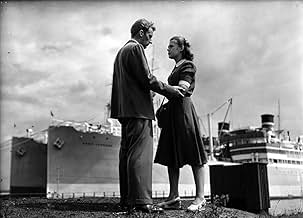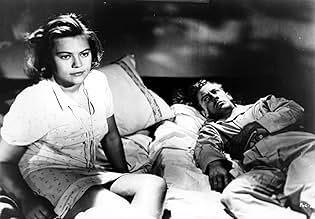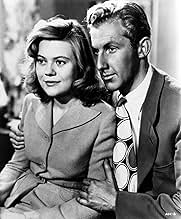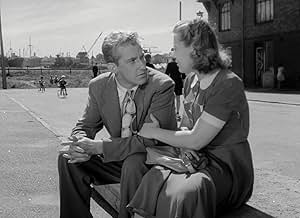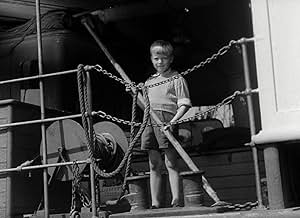Ajouter une intrigue dans votre langueA suicidal factory girl out of reformatory school, anxious to escape her overbearing mother, falls in love with a sailor who can't forgive her past.A suicidal factory girl out of reformatory school, anxious to escape her overbearing mother, falls in love with a sailor who can't forgive her past.A suicidal factory girl out of reformatory school, anxious to escape her overbearing mother, falls in love with a sailor who can't forgive her past.
- Réalisation
- Scénario
- Casting principal
Edvard Danielsson
- Klockaren
- (scènes coupées)
Carl Deurell
- Prästen
- (scènes coupées)
Kolbjörn Knudsen
- En sjöman
- (scènes coupées)
Gunnar Nielsen
- En herre (1)
- (scènes coupées)
Avis à la une
For viewers born decades after the end of the second worldwide conflict, it's hard to imagine anything but joy and optimism in the hearts of the younger population that went through what was probably the hardest (and certainly darkest) part of their lives. We've all basked in stories, real and fictional, that knighted those who fathered the baby-boomers with the title of the greatest generation, one whose youth was sacrificed at history's altar ... but that's overlooking their ordinariness, how modest their aims were and thus how poignantly relatable their lives could be outside the epic scope of war and other life-and-death situations.
When Ingmar Bergman "Port of Call" starts, war is way over and there's no any indication of life-threatening situations yet the film opens with a startling suicide attempt: a girl takes a big dive from a dock and many people come to rescue her, including a war veteran who just settled in the port town. From what it looks like, the two protagonists didn't benefit from the kind of existential canvases that invite for optimism: the man is a sailor back from war, disillusioned and hiding his easy-going nature behind a mask of cynicism, his name is Gösta (Bengt Eklund), the woman is a young factory girl, depressed and insecure, with the kind of troubled past that makes any romance doomed from the start, and whose roots are to be found within a tense relationship with her overbearing mother. She's Berit (Nine-Chrstine Jönsson).
Those were the neo-realism days in Europe and the noir era in the U.S.A, the film, maybe unconsciously driven by these two influences, doesn't intend to paint a glamorous romance of any kind but rather a life capsule in a small seaside working-class town, a sort of Swedish "On the Waterfront" where we follow the lives of two loners as they converged one night at a dance. It's an immediate and mutual appreciation that never feels forced nor contrived, it IS believable that the two would find oasis of serenity within each other. To use fitting metaphors, Gösta has nothing but dreams of stability, he's a boat that wants to set ashore someplace, drop the anchor once and for all, he just doesn't have a compass, Berit on the other hand is a raft drifting in the ocean of her own guilt-ridden past and has no rows whatsoever to move on.
In a way the film is more about Berit's attempt to come to term with that past of hers, it's not much a character study but a psychological journey into a mindset that made happiness as improbable as the sight of land for a boat without any guidance. Gösta is an active and passive observer who acts as a lookout sometimes and some others becomes a true rower on Berit's frail embarkation. He knows she's as tormented as he is, he doesn't care much about her past though he's clearly displeased by the constant harassment she gets from men, raising suspicions of the ugliest sorts. So, as the film moves on and their relationship thickens, more obstacles come across their journey to the promised harbor, divulgated through flashbacks, revealed secrets and a subplot involving Berit's friend Gertrud, Bibi Nelson.
The flashbacks on Berit's life are depressing and bleak: marital fights, scandals, life in reformatory school that borders on prostitution and debauchery, a difficult mother-and-daughter relationship, it's a cocktail of lurid negativity that darkens an already heavy-loaded movie and the irony is that the friend Gertrud got an even worse deal. The contrast between Berit and Gertrud is interesting on two levels: it highlights the fact that Berit is abler to fight her own demons and maybe her real tragedy is that she can't handle happiness even when served on a silver platter, as if it was a dish best served cold. The second level is that the film is a powerful social commentary on the tormented lives of women with a 'bad rep' in a system that often pose as a judge of morality, driving them to the most extreme and sometimes macabre corners.
Bergman, in one of his breakthrough movies, displays the kind of sensitivities that made he glorious days of European neo-realism, his "Port of Call" is as powerful and introspective as the Italian classics of the late 1940s through this portrayal of two lost souls who come to find a true meaning to their lives after many years of unhappiness and resentment. For that, the director shows a predisposition for lengthy intimate scenes where two faces are close to each other and one speak alone without looking at the other, as if the act of talking was individual and solitary in essence. But when Berit confesses her past to Gösta, it looks like she's talking to us; from either point of view, ours or Gösta's, you can feel the emergence of a cinematic talent and a unique ability to paint human emotions with consideration to the viewers.
The film is rather simple but it's made in such a way we feel like belonging to the screen... and that's Bergman's power, every once in a while, "Port of Call" ceases to be that gripping drama and reaches an unexpected summit of film-making showing the early signs of the genius, small moments where souls are confronted one to another, talking, deciding and acting. The tension is real and makes the few moments of relief only more rewarding. And that's an adjective I'd use to describe the ending, one that such a movie called for, after so many questioning about life, it was only fair that the two young protagonists, directed under a then-young director could find one reason to two to see the future in brighter colors, almost spoiled by the poster.
When Ingmar Bergman "Port of Call" starts, war is way over and there's no any indication of life-threatening situations yet the film opens with a startling suicide attempt: a girl takes a big dive from a dock and many people come to rescue her, including a war veteran who just settled in the port town. From what it looks like, the two protagonists didn't benefit from the kind of existential canvases that invite for optimism: the man is a sailor back from war, disillusioned and hiding his easy-going nature behind a mask of cynicism, his name is Gösta (Bengt Eklund), the woman is a young factory girl, depressed and insecure, with the kind of troubled past that makes any romance doomed from the start, and whose roots are to be found within a tense relationship with her overbearing mother. She's Berit (Nine-Chrstine Jönsson).
Those were the neo-realism days in Europe and the noir era in the U.S.A, the film, maybe unconsciously driven by these two influences, doesn't intend to paint a glamorous romance of any kind but rather a life capsule in a small seaside working-class town, a sort of Swedish "On the Waterfront" where we follow the lives of two loners as they converged one night at a dance. It's an immediate and mutual appreciation that never feels forced nor contrived, it IS believable that the two would find oasis of serenity within each other. To use fitting metaphors, Gösta has nothing but dreams of stability, he's a boat that wants to set ashore someplace, drop the anchor once and for all, he just doesn't have a compass, Berit on the other hand is a raft drifting in the ocean of her own guilt-ridden past and has no rows whatsoever to move on.
In a way the film is more about Berit's attempt to come to term with that past of hers, it's not much a character study but a psychological journey into a mindset that made happiness as improbable as the sight of land for a boat without any guidance. Gösta is an active and passive observer who acts as a lookout sometimes and some others becomes a true rower on Berit's frail embarkation. He knows she's as tormented as he is, he doesn't care much about her past though he's clearly displeased by the constant harassment she gets from men, raising suspicions of the ugliest sorts. So, as the film moves on and their relationship thickens, more obstacles come across their journey to the promised harbor, divulgated through flashbacks, revealed secrets and a subplot involving Berit's friend Gertrud, Bibi Nelson.
The flashbacks on Berit's life are depressing and bleak: marital fights, scandals, life in reformatory school that borders on prostitution and debauchery, a difficult mother-and-daughter relationship, it's a cocktail of lurid negativity that darkens an already heavy-loaded movie and the irony is that the friend Gertrud got an even worse deal. The contrast between Berit and Gertrud is interesting on two levels: it highlights the fact that Berit is abler to fight her own demons and maybe her real tragedy is that she can't handle happiness even when served on a silver platter, as if it was a dish best served cold. The second level is that the film is a powerful social commentary on the tormented lives of women with a 'bad rep' in a system that often pose as a judge of morality, driving them to the most extreme and sometimes macabre corners.
Bergman, in one of his breakthrough movies, displays the kind of sensitivities that made he glorious days of European neo-realism, his "Port of Call" is as powerful and introspective as the Italian classics of the late 1940s through this portrayal of two lost souls who come to find a true meaning to their lives after many years of unhappiness and resentment. For that, the director shows a predisposition for lengthy intimate scenes where two faces are close to each other and one speak alone without looking at the other, as if the act of talking was individual and solitary in essence. But when Berit confesses her past to Gösta, it looks like she's talking to us; from either point of view, ours or Gösta's, you can feel the emergence of a cinematic talent and a unique ability to paint human emotions with consideration to the viewers.
The film is rather simple but it's made in such a way we feel like belonging to the screen... and that's Bergman's power, every once in a while, "Port of Call" ceases to be that gripping drama and reaches an unexpected summit of film-making showing the early signs of the genius, small moments where souls are confronted one to another, talking, deciding and acting. The tension is real and makes the few moments of relief only more rewarding. And that's an adjective I'd use to describe the ending, one that such a movie called for, after so many questioning about life, it was only fair that the two young protagonists, directed under a then-young director could find one reason to two to see the future in brighter colors, almost spoiled by the poster.
The sailor Gösta Andersson (Bengt Eklund) quits sailing in Gothenburg and while walking in the harbor, he rescues the worker Berit Irene Holms (Nine-Christine Jönsson) that has just jumped into the sea attempting to commit suicide. Then he meets his friends and finds a job of dockworker with them. A couple of days later, Gösta and Berit meet each other by chance in a ball and they have sex at her house. Gösta dates the needy Berit that falls in love with him and decides to tell her past in a reformatory school and her former relationships to him. But the twenty-nine year old man is not ready to forget the past of Berit and forgive her.
"Hamnstad" is the fifth Bergman's film with a bitter and bleak love story of a needy and lonely girl raised in a dysfunctional family with a domineering mother that is sent to a reformatory school, and her boyfriend that likes her, but can not forgive her past. This is the typical anti-Hollywood love story, with themes that seems to be ahead of time (for a 1948 film), such as abortion and one night stand between the couple that has just met each other. My vote is eight.
Title (Brazil): "Porto" ("Seaport")
"Hamnstad" is the fifth Bergman's film with a bitter and bleak love story of a needy and lonely girl raised in a dysfunctional family with a domineering mother that is sent to a reformatory school, and her boyfriend that likes her, but can not forgive her past. This is the typical anti-Hollywood love story, with themes that seems to be ahead of time (for a 1948 film), such as abortion and one night stand between the couple that has just met each other. My vote is eight.
Title (Brazil): "Porto" ("Seaport")
This is a very nice early Ingmar Bergman film, one that's well composed, touches on daring subjects, and has a gritty, neorealist feel to it. Via flashbacks and nonlinear storytelling, we gradually come to understand a troubled young woman (Nine-Christine Jönsson), who we first see jumping into the water in a suicide attempt. We see the difficulty of her growing up with parents who are in a bad marriage, and the profound impact this has on her life. We see teenage rebellion, and feelings of loneliness and depression. We see female sexuality for enjoyment and as a way of escaping reality, but then facing the double standard in society. And we see a black market abortion, with the film showing both the hypocrisy and the unfairness of these not being legal in Sweden in 1948, except for "socio-medicinal" grounds like the eugenic case it refers to. All of these things and some cool working class scenes on the docks and in a factory give the film a dark sense of realism.
The performance from Jönsson is excellent, and the role and her portrayal reminded me of Harriet Andersson from some of Bergman's films in the 1950's. She plays vulnerable, defiant, loving, and lonely all very well, and comes across as a feminist hero to me. Early on we see her deftly fend off the supervisor's creepy suggestions for a little payback after he's put in a good word for her, and she puts up with several crude things like that over the course of the film. We can see the potential and goodness in her character, but at the same time, she has to wear her reform school past like a scarlet letter, and has difficulties coping in a world that judges instead of empathizes with her. She has seen enough of the world and of men even at her young age to doubt her lover (Bengt Eklund) will stick around, and the scene the two have in the hotel room, interrupted by her friend (Mimi Nelson), is one of the film's best. The scene where she exchange slaps with her mother (Berta Hall) is also a good one.
The film's frank references to premarital sex, abortion, and a brief bit of nudity were all things American films would not touch for years, and just as important are its questioning of authority and social conventions. The film was only released in the UK after 10 years with an X rating, and only released in America in 1963 after Bergman had won 2 Oscars. There are some moments when the young director should have exercised restraint, such as when Jönsson writes 'lonely' on the mirror in lipstick, or when Eklund rages in an overwrought way in the company of a prostitute, but all in all, he's in fine form here. This is a good, meaty film on its own, and it's even more interesting because of where it stands in his oeuvre. Well worth seeing, and deserves a higher average rating.
The performance from Jönsson is excellent, and the role and her portrayal reminded me of Harriet Andersson from some of Bergman's films in the 1950's. She plays vulnerable, defiant, loving, and lonely all very well, and comes across as a feminist hero to me. Early on we see her deftly fend off the supervisor's creepy suggestions for a little payback after he's put in a good word for her, and she puts up with several crude things like that over the course of the film. We can see the potential and goodness in her character, but at the same time, she has to wear her reform school past like a scarlet letter, and has difficulties coping in a world that judges instead of empathizes with her. She has seen enough of the world and of men even at her young age to doubt her lover (Bengt Eklund) will stick around, and the scene the two have in the hotel room, interrupted by her friend (Mimi Nelson), is one of the film's best. The scene where she exchange slaps with her mother (Berta Hall) is also a good one.
The film's frank references to premarital sex, abortion, and a brief bit of nudity were all things American films would not touch for years, and just as important are its questioning of authority and social conventions. The film was only released in the UK after 10 years with an X rating, and only released in America in 1963 after Bergman had won 2 Oscars. There are some moments when the young director should have exercised restraint, such as when Jönsson writes 'lonely' on the mirror in lipstick, or when Eklund rages in an overwrought way in the company of a prostitute, but all in all, he's in fine form here. This is a good, meaty film on its own, and it's even more interesting because of where it stands in his oeuvre. Well worth seeing, and deserves a higher average rating.
After making it through many of the more well-known Ingmar Bergman films, I've turned my attention to early Bergman. This Ingmar Bergman retrospective has certainly been the one with the loosest viewing schedule, which isn't to the project's detriment. With a filmmaker like Ingmar Bergman, one with pronounced themes to his films, it is interesting to see how he carries out those themes in each period of his work. In his 1948 film, Port of Call, Bergman examined the intricacies of human existence through the eyes of a suicidal factory worker desperate to escape the weight of her overbearing mother. Starring Nine-Christine Jönsson and Bengt Eklund, Ingmar Bergman perfectly explores the struggle of living a life free of the strains of complicated human relationships and the prisons of our own minds that many are often unable to escape from.
Berit (Nine-Christine Jönsson) recently released from reformatory school following an attempted suicide, is back under the thumb of her manipulative and overbearing mother. She sees a way out when she meets Gösta, a man she is able to convince is the first one to experience her passions. Berit, unable to properly experience love, sees Gösta as, not only a way to break free from her mother's influence, but also to escape her laborious job at the factory. A marriage would also prove to Berit's social worker that Berit was establishing a stable foundation for herself and would be free from the threat of returning to the reformatory school. Her plans for freedom with Gösta are foiled, however, when he cannot forgive her past.
Family troubles, especially overbearing or neglectful parents are a constant theme in the films of Ingmar Bergman and apparently have been since his earliest features. The intricacies of familial disconnect are fascinating, and Bergman tunes into those intricacies in a way I have seldom seem from other filmmakers. One of my favorite aspects of Bergman films is how he illustrates the brokenness of people, and how that brokenness contributes to their inabilities to form successful relationships. I continue to be amazed how keenly Bergman tapped into the human spirit. Another mainstay in Bergman's filmography is how often he depicted people working jobs they don't like in order to maintain lives that were personally unfulfilling. Much like in Summer with Monika, our protagonists in Port of Call worked jobs that robbed them of their essential human fulfillment and left them in a constant state of emotional exhaustion. The only place to relieve the stresses of the world is in the cinema. The scene in which Berit has removed herself from every disappointment of existence when she is freely laughing in a crowded theatre was extraordinary. It reminded me of the scene in Louis Malle's Au revoir Les Enfants where the only place everyone was equal and could enjoy themselves was during a screening of Charlie Chaplin's The Immigrant. Cinema as an artistic medium has relieved the pressures of existence since its inception, and Ingmar Bergman films are no exception to this rule.
Berit (Nine-Christine Jönsson) recently released from reformatory school following an attempted suicide, is back under the thumb of her manipulative and overbearing mother. She sees a way out when she meets Gösta, a man she is able to convince is the first one to experience her passions. Berit, unable to properly experience love, sees Gösta as, not only a way to break free from her mother's influence, but also to escape her laborious job at the factory. A marriage would also prove to Berit's social worker that Berit was establishing a stable foundation for herself and would be free from the threat of returning to the reformatory school. Her plans for freedom with Gösta are foiled, however, when he cannot forgive her past.
Family troubles, especially overbearing or neglectful parents are a constant theme in the films of Ingmar Bergman and apparently have been since his earliest features. The intricacies of familial disconnect are fascinating, and Bergman tunes into those intricacies in a way I have seldom seem from other filmmakers. One of my favorite aspects of Bergman films is how he illustrates the brokenness of people, and how that brokenness contributes to their inabilities to form successful relationships. I continue to be amazed how keenly Bergman tapped into the human spirit. Another mainstay in Bergman's filmography is how often he depicted people working jobs they don't like in order to maintain lives that were personally unfulfilling. Much like in Summer with Monika, our protagonists in Port of Call worked jobs that robbed them of their essential human fulfillment and left them in a constant state of emotional exhaustion. The only place to relieve the stresses of the world is in the cinema. The scene in which Berit has removed herself from every disappointment of existence when she is freely laughing in a crowded theatre was extraordinary. It reminded me of the scene in Louis Malle's Au revoir Les Enfants where the only place everyone was equal and could enjoy themselves was during a screening of Charlie Chaplin's The Immigrant. Cinema as an artistic medium has relieved the pressures of existence since its inception, and Ingmar Bergman films are no exception to this rule.
6sol-
An early film from Ingmar Bergman, it is just as interesting on a visual scope as his films usually are, with the docklands filmed well and good use of panning and dolly work throughout. In terms of story and acting though, this is rather ordinary stuff, despite some interesting ideas and philosophies about freedom. It seems the easy way to out to just classify this film as interesting but not up to the standard that Bergman would later set, however I cannot think of much else to say here. It certainly is not as thought-provoking and intense as some of his later films, and for those not interested in Bergman or clever camera movement, I could easily imagine this piece coming across as boring.
Le saviez-vous
- AnecdotesThe book which Gösta reads on his bed is 'Resor utan mål' ('Journeys Without Destination') by Swedish author and future Nobel laureate in Literature (1974) Harry Martinson. Martinson was, indeed, a sailor before becoming an author, and the book, published in 1932 as Martinson's first prose volume (his greatest fame would come for his poetry), was a document of his own experiences as one, written at twenty-eight after he had given up the sea due to a combination of lack of employment and a bout of tuberculosis. A sailor like Gösta would indeed have found much interest in the book, as it dealt realistically with the life of a sailor from his country living a life very similar to his own. The book itself has sadly never been published in English, but Martinson's second novel, 'Kap Farväl!', somewhat similar to 'Resor utan mål', was translated as 'Cape Farewell'. Director Ingmar Bergman was indeed an admirer of his countryman Martinson and, in 1964, he staged the premiere of Martinson's play 'Tre knivar från Wei' ('Three Knives From Wei'), although, unfortunately, he considered the production an unmitigated disaster.
- GaffesWhen the camera pans from Gösta to Skåningen in the whistling scene, an object which is probably a microphone can be seen briefly in the upper right frame.
- Citations
Gertrud's Father: She never gave me any joy. Perhaps it's turned out for the best.
- ConnexionsFeatures Stackars lilla Sven (1947)
- Bandes originalesLa paloma
("A Dove")
Composed by Sebastian Iradier (1859)
Swedish text by Ernst Wallmark
Performed by Bengt Eklund
Meilleurs choix
Connectez-vous pour évaluer et suivre la liste de favoris afin de recevoir des recommandations personnalisées
- How long is Port of Call?Alimenté par Alexa
Détails
- Durée
- 1h 40min(100 min)
- Couleur
- Mixage
- Rapport de forme
- 1.37 : 1
Contribuer à cette page
Suggérer une modification ou ajouter du contenu manquant

